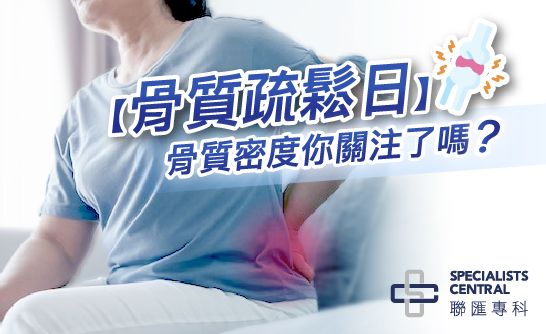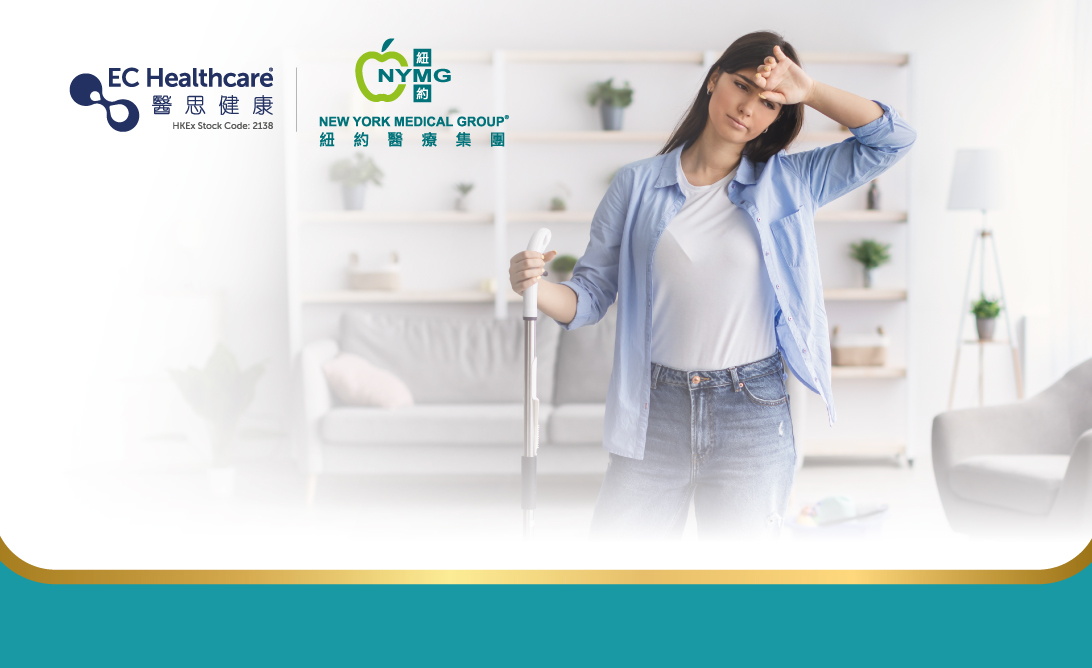[World Osteoporosis Day] Have you been concerned about your bone density?


World Osteoporosis Day takes place every year on October 20. Osteoporosis is recognised by the World Health Organization as the second most significant disease in the world, and tens of thousands of people in Hong Kong suffer from this condition every year. Bones become brittle when affected by this disease, and even a slight fall can easily lead to fractures and other problems, which can have a great impact on daily life. It is therefore important to pay more attention to our bone density and to take early action to prevent osteoporosis.
What causes bone loss?
Bone density in the human body continues to grow until it reaches its peak at around 25 years old, and then the symptom of bone loss emerges. As we age, we lose bone density every year. Men lose about 0.5 – 1% of bone mass while women lose 1 – 2% of bone mass. In particular, bone loss is at its peak in the 3-5 years after menopause.
When bone is lost, many gaps or holes will appear in the bones, which were originally dense. The gaps and holes make the bones weaker, hollower, and more prone to fracture.
Apart from ageing, other factors also contribute to bone loss. When women go through menopause, the decline in oestrogen accelerates bone deterioration. City dwellers, in particular, suffer from multiple risk factors including nutritional disorders, inadequate calcium intake, frequent smoking and drinking, insufficient exercise, lack of sun exposure, presence of certain diseases, or consumption of certain medications that cause bone loss.
Symptoms of Osteoporosis
Osteoporosis is asymptomatic at the early stage. We cannot notice it until bone fractures occur. Patients usually experience the following symptoms:
Pain
Bone pain and weakness throughout the body. It happens most often in the lower back, the pelvis and the back, which gradually becomes more persistent and worse.
Bone Fractures
Fractures can be caused by a slight touch, using excessive force or a fall. Fractures of the vertebrae and radius of the forearm are common at the age of 50-60; fractures of the proximal humerus, tibia, pelvis and hip bone are common at the age of 70-80, with a mortality rate of 50% due to hip bone fractures.
Hunchback
Vertebrae fractures will cause a noticeable shortening of height due to chronic compression.
Scoliosis, Joint Deformity
Many people prefer to ignore the pain and mobility problems due to the huge medical bills associated with the fracture surgery.
It is very difficult to heal bones that have suffered from osteoporosis. Therefore, bone health should be concerned as early as possible, preferably in the adolescence stage. The earlier you start taking calcium supplements, the better the results will be and the less likely you will have fractures in the future. Start when you are small and build strong bones so that you can continue to move freely in your old age.
Osteoporosis Prevention
Eat calcium-rich foods such as soy milk, sesame seeds, tofu and okra, and foods that promote calcium absorption such as nuts and deep-sea fish (e.g. salmon), which are high in vitamin D.
Before the degeneration of joints worsens, you should engage in regular aerobic exercises to improve your cardiovascular function, get plenty of vitamin D from the sun, increase muscle mass and strengthen your joints through weight training for different muscle groups, and swim more if you prefer low-intensity exercise.
Conduct Regular Bone Density Tests
Don’t underestimate osteoporosis. A fracture is not only painful but also disruptive to daily life. With continued bone loss, your mobility and self-care ability deteriorate, you become totally dependent on others for care or are admitted to a nursing home, and you eventually die from other complications due to the lack of exercise and bacterial infections.
Therefore, it is important to re-examine your bone health from now on, especially for older women. Apart from regular breast or uterine examinations, you should also undergo regular bone density tests. It is recommended that women aged 50 or above should undergo bone density tests every three to four years to take early precautions to prevent bone deterioration.








